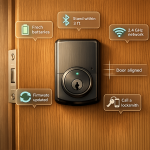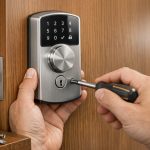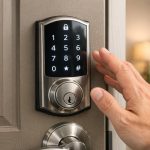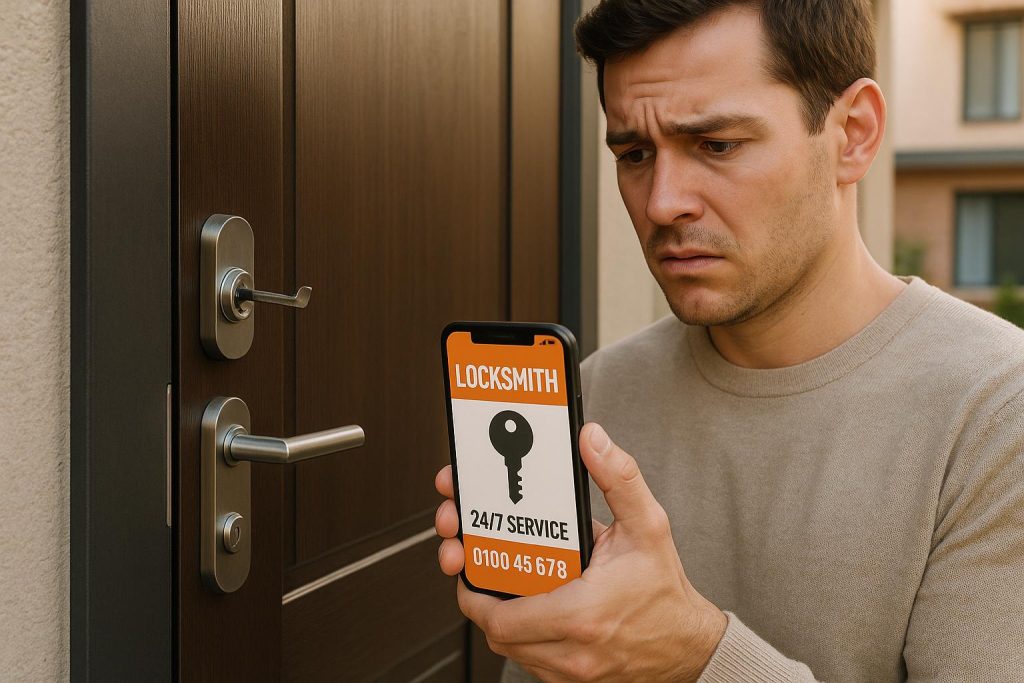Locksmith scams are increasingly common, preying on people during emergencies like lockouts. Scammers lure victims with low quotes, then inflate prices once on-site, often using destructive methods or claiming unnecessary repairs. These schemes can cost hundreds of dollars and leave your property less secure.
Key Takeaways:
- Red Flags: Unmarked vehicles, lack of credentials, refusal to provide estimates, or cash-only demands.
- Common Tactics: Low initial quotes, aggressive upselling, unnecessary drilling, and hidden fees.
- Prevention Tips: Research locksmiths in advance, verify licenses and reviews, and always request a written estimate.
Be proactive. Save contact details for trusted locksmiths now to avoid falling victim to scams later. In Pittsburgh, Sherlock’s Locksmith is a reliable option for secure, transparent services.
Common Locksmith Scam Tactics
Low Quotes Followed by High Prices
One of the most common locksmith scams starts with an attractively low quote – think $15, $20, or $29. These prices are designed to hook customers in distress. But once the locksmith arrives, the story changes. Suddenly, they claim the job is more complicated than expected, and the cost skyrockets. What began as a $20 service call can balloon to $150 or even over $1,000.
"If a low price looks too good to be true then more often than not it will be!" – Locksmiths.co.uk
Scammers often justify these price hikes with excuses like needing to replace your lock immediately, charging extra for after-hours service, or requiring special equipment for drilling – even when simpler, non-damaging solutions would work just fine. In many cases, they deliberately use destructive techniques to inflate the final bill.
Unnecessary or Destructive Services
Another red flag is when locksmiths use aggressive, damaging methods instead of proper techniques. Instead of carefully picking the lock or using specialized tools, they might jump straight to drilling, destroying the lock in the process. This not only results in unnecessary damage but also increases the cost of repairs.
Some scammers might even go a step further, performing tasks you didn’t authorize, like excessive rekeying or installing unnecessary security upgrades, all to pad the bill.
In contrast, legitimate locksmiths focus on non-destructive methods to protect your existing locks. They rely on professional tools and techniques to open locks without damage. Drilling is always a last resort, used only when other methods fail or when dealing with high-security locks that genuinely require it.
Locksmith scam warning: What one woman was charged after a lockout
Warning Signs of Fraudulent Locksmiths
Spotting the warning signs of a fraudulent locksmith can protect you from falling victim to their schemes. Here are the key red flags to keep in mind.
Lack of Credentials or Identification
Reputable locksmiths come prepared with proper licenses, certifications, and photo identification. They usually arrive in clearly branded vehicles, wear uniforms with company logos, and can provide a physical business address. These details help establish their legitimacy.
On the other hand, scammers often show up in unmarked vehicles or personal cars and avoid showing any form of identification. Some may use temporary magnetic signs on their vehicles that can be easily removed to avoid being traced later.
If a locksmith can’t provide a physical business address or only lists a P.O. Box, proceed with caution. Similarly, if they claim to be local but can’t tell you where their shop is located, it’s a strong indication something is off.
Refusal to Provide Estimates or Invoices
A trustworthy locksmith will always provide a clear, written estimate before starting any work. They’ll explain the services they’ll perform, outline any necessary parts, and give you a detailed breakdown of costs. After the job is done, they’ll issue an invoice with their business name, itemized charges, and payment terms.
Scammers tend to avoid creating any paper trail. They might give vague verbal estimates like “around $50” or refuse to provide written details until after the work is complete.
Be cautious of locksmiths who won’t share their full business name or contact information upfront. Legitimate businesses are transparent and want you to know exactly who you’re working with.
Pressure Tactics or Cash-Only Payment
Fraudulent locksmiths often use high-pressure tactics to rush your decision. They might insist your lock is beyond repair and needs immediate replacement, even if a simple fix would do the job. To add urgency, they may claim they have another emergency waiting or warn that prices will increase if you don’t act right away.
Another red flag is a demand for cash-only payments. Legitimate locksmiths accept various payment methods, including credit cards, checks, and digital options. They understand that most people don’t carry large amounts of cash, especially during emergencies.
Scammers prefer cash because it leaves no payment trail. They might claim their card reader is broken or offer suspicious “cash discounts” to pressure you into paying immediately.
These tactics highlight why it’s crucial to verify a locksmith’s credentials and trust your instincts. A professional locksmith will remain calm, answer your questions clearly, and respect your decision-making process.
How to Avoid Locksmith Scams
A little preparation and careful attention can go a long way in protecting yourself from locksmith scams.
Research Local Locksmiths Ahead of Time
Don’t wait for an emergency to start looking for a locksmith. Being locked out of your car late at night or finding yourself unable to enter your home can create a sense of urgency that scammers are quick to exploit. In those moments, it’s easy to call the first number you find without taking the time to verify the company.
To avoid this, compile a list of trusted locksmiths in your area before you need them. Save their contact details in your phone for easy access. Focus on established businesses with physical storefronts in your community. For example, Sherlock’s Locksmith in Pittsburgh is a local option with certified professionals and clear pricing, making it a dependable choice for emergencies.
If possible, prioritize locksmiths that offer 24/7 services and mobile response. Many legitimate companies provide round-the-clock assistance and come equipped to handle a variety of lock and key challenges on-site.
You can also ask friends, family, or local social media groups for recommendations. Once you have a few names, take the time to verify their credentials to ensure they’re trustworthy.
Confirm Credentials and Check Reviews
Always verify a locksmith’s legitimacy before letting them work on your property. Start by checking their business license and certifications. Many states require locksmiths to be licensed, and you can usually confirm this information through your state’s licensing board.
Use online maps to verify the locksmith’s physical address. Scammers often list fake addresses or only provide P.O. boxes. Cross-check the location they advertise with what appears on online mapping services to ensure it’s a real, physical location.
Look at reviews on multiple platforms, but stay alert for fake ones. Genuine businesses typically have a mix of feedback, including positive reviews and occasional constructive criticism, spanning several months or years. Be cautious of companies with only glowing, recent reviews or overly promotional language.
Check the business’s rating on the Better Business Bureau (BBB) website. The BBB can provide insights into unresolved complaints and how the company handles disputes.
Lastly, confirm that the locksmith carries liability insurance. Professional locksmiths should have insurance to cover any accidental damage. Don’t hesitate to ask for proof of coverage before agreeing to any work.
Get Written Estimates and Clarify Costs
Never proceed with locksmith services without a clear, written estimate. A trustworthy locksmith will provide a detailed breakdown of costs, including labor, parts, and any additional fees, either over the phone or after assessing your situation.
Ask upfront about any potential extra charges, such as service call fees, mileage, or after-hours rates. Evening, weekend, or holiday services often cost more, and you should be aware of these fees before agreeing to the work.
Before any work begins, request a written estimate that includes the company’s name, contact information, and a detailed service breakdown. If a locksmith refuses to provide this or avoids discussing pricing, it’s a red flag – move on to someone else.
Legitimate locksmiths typically accept a variety of payment methods, including credit cards, checks, and digital payments. Be wary of those who only take cash or demand full payment upfront.
Finally, ask about the company’s policy on price changes. While unexpected issues can arise, a professional locksmith will explain any additional costs and get your approval before proceeding.
Keep all written estimates, invoices, and any identification details from the locksmith. This documentation will be invaluable if you need to address disputes later.
sbb-itb-643e28e
Choosing a Reliable Locksmith in Pittsburgh, PA
When it comes to finding a locksmith you can trust in Pittsburgh, the process boils down to identifying the hallmarks of a reputable and professional service provider. These qualities separate reliable businesses from those that might leave you disappointed – or worse, at risk.
What to Look for in a Trustworthy Locksmith
A dependable locksmith in Pittsburgh will have a physical, verifiable location and hold proper state licenses and certifications. They’ll also provide clear, upfront pricing without sneaky hidden fees and carry insurance to protect both you and their employees. Offering 24/7 emergency services with reasonable response times is another sign of professionalism. Most importantly, they’ll treat customers respectfully and avoid high-pressure sales tactics.
Among the many locksmiths in the area, one name consistently checks all these boxes.
Why Sherlock’s Locksmith Stands Out in Pittsburgh
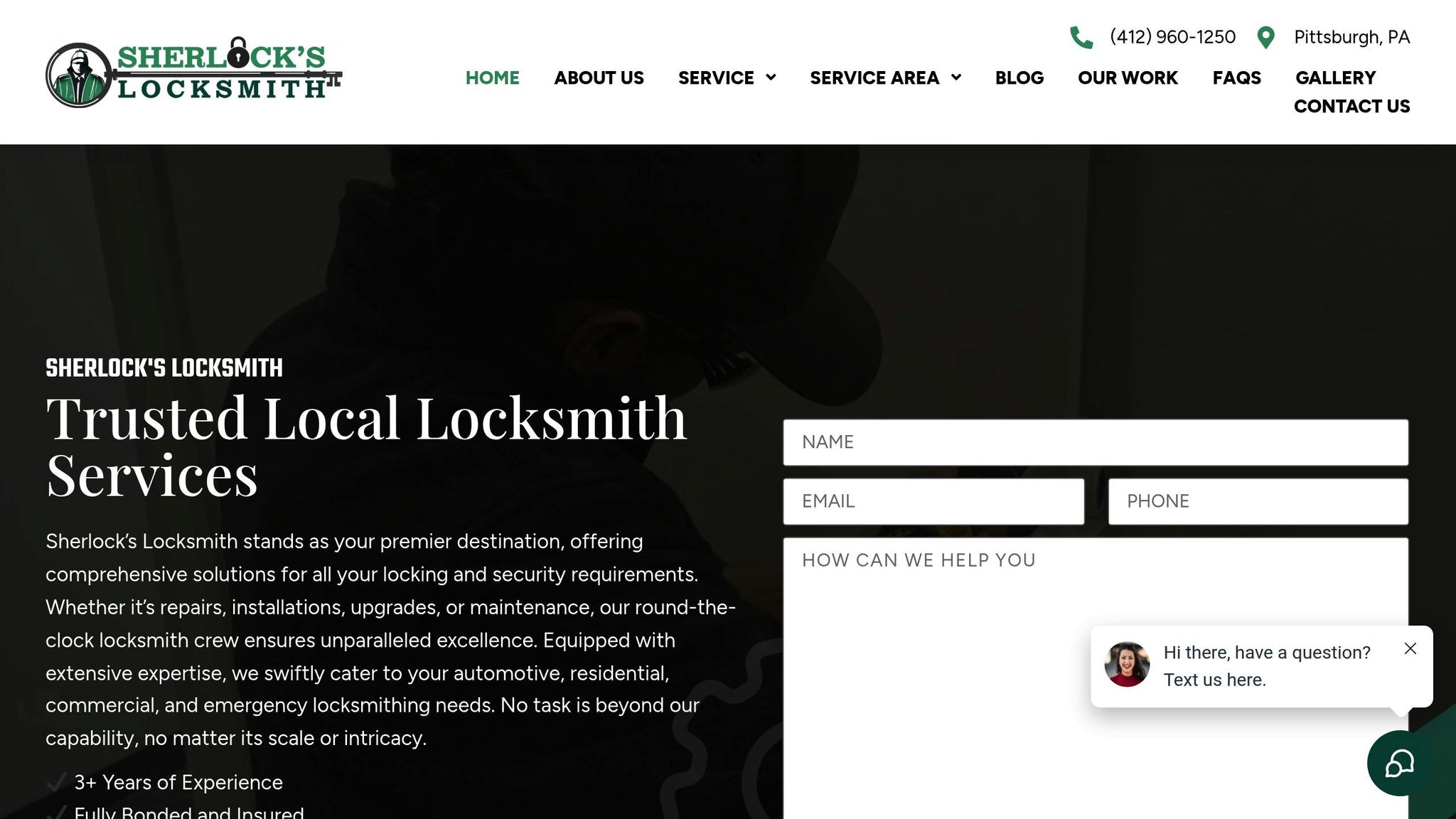
Sherlock’s Locksmith has built a reputation as a trusted local provider by not only meeting these criteria but exceeding expectations in service and technology. Their team of certified technicians stays sharp with ongoing training, ensuring they’re always up to date with the latest security advancements.
What sets Sherlock’s Locksmith apart is their commitment to cutting-edge technology. Their technicians arrive equipped with advanced tools and are proficient in handling modern security systems like keyless entry, biometric locks, and electronic access controls. This expertise places them a step above basic locksmith operations.
Being a locally established business also gives Sherlock’s Locksmith a level of accountability that out-of-town call centers or temporary operators simply can’t offer. If follow-up service is needed or an issue arises, customers know exactly where to find them.
Another thing that makes Sherlock’s Locksmith a top choice? Their wide range of services. They cover everything from automotive needs like transponder key programming and ignition repairs to residential services such as lock rekeying and security upgrades. On the commercial side, they handle everything from simple lock repairs to designing complex master key systems. This means you won’t need to juggle multiple providers – Sherlock’s Locksmith can handle it all. Plus, their technicians take the time to understand your specific security needs, building a relationship that ensures tailored, reliable solutions.
Conclusion
Locksmith scams are becoming an increasing concern, with reports of overcharging by rogue operators jumping by 25% and a rise in consumer complaints. These scammers prey on people during moments of urgency – like being locked out of a car late at night or unable to get into your home after a tiring day. The trend underscores the importance of taking proactive steps to protect yourself.
Many of these fraudulent operators advertise enticingly low prices, such as $39–$59, only to charge upwards of $500 for a simple lockout service. They often use high-pressure tactics, demand cash-only payments, and exploit the stress of the situation to their advantage.
"The key to avoiding locksmith scams is knowing how to verify a locksmith’s legitimacy, request clear estimates, and watch for warning signs like unusually low quotes that jump upon arrival." – illustrarch Team
The best way to avoid falling victim is preparation. Take the time to research trustworthy locksmiths, confirm their credentials and insurance, and always insist on a written estimate before they start any work. Be alert for warning signs, such as unmarked vehicles, refusal to show identification, or immediate suggestions to drill your locks unnecessarily. If anything feels off, decline the service and turn to a locksmith you trust.
For Pittsburgh residents, having a reliable local locksmith on hand, like Sherlock’s Locksmith, can make all the difference. With certified and transparent services, they provide peace of mind in emergencies. Staying informed and choosing legitimate professionals not only helps you avoid scams but also protects your property, your wallet, and your sense of security.
FAQs
How can I make sure a locksmith is trustworthy before hiring them?
How to Ensure Your Locksmith Is Reliable
When hiring a locksmith, it’s crucial to verify their credibility. Start by checking if they hold the necessary licensing and insurance required in your state. Don’t hesitate to ask for their license number and confirm its validity. You can also cross-check their business details on trusted platforms like Google Maps or local directories.
Pay attention to signs of professionalism. Legitimate locksmiths often arrive in marked vehicles, wear uniforms, and carry clear identification. Additionally, they should ask you for proof that you have the right to access the property before beginning any work. Be cautious of locksmiths who show up in unmarked vehicles or make claims that can’t be verified. Taking these precautions helps you avoid scams and ensures you’re dealing with a dependable professional.
What should I do if I think I’ve been scammed by a locksmith?
If you think you’ve fallen victim to a locksmith scam, don’t panic. Start by collecting all the evidence you can – this includes receipts, written estimates, and any communication you’ve had with the locksmith. These records will be essential if you need to take further action.
Your first step should be reporting the incident to your local police department to create an official record. Then, consider filing a complaint with consumer protection organizations like the Better Business Bureau (BBB) or your state’s attorney general’s office. These agencies can investigate your claim and may help prevent others from being scammed by the same locksmith.
To avoid similar situations in the future, take time to research locksmith services before you need them. Look for well-established companies with certified technicians. For instance, Sherlock’s Locksmith in Pittsburgh, PA, is known for offering trustworthy and professional locksmith services.
Why should you ask for a written estimate from a locksmith before they start working?
Requesting a written estimate from a locksmith before any work starts is a smart way to avoid surprise charges. It lays out the exact costs upfront, helping you steer clear of hidden fees while giving you a clear record of the agreed pricing.
Having this estimate also fosters trust and openness, reassuring you that the locksmith is reliable. Make sure the estimate breaks down everything – labor, parts, and any extra fees – before you approve the work.



